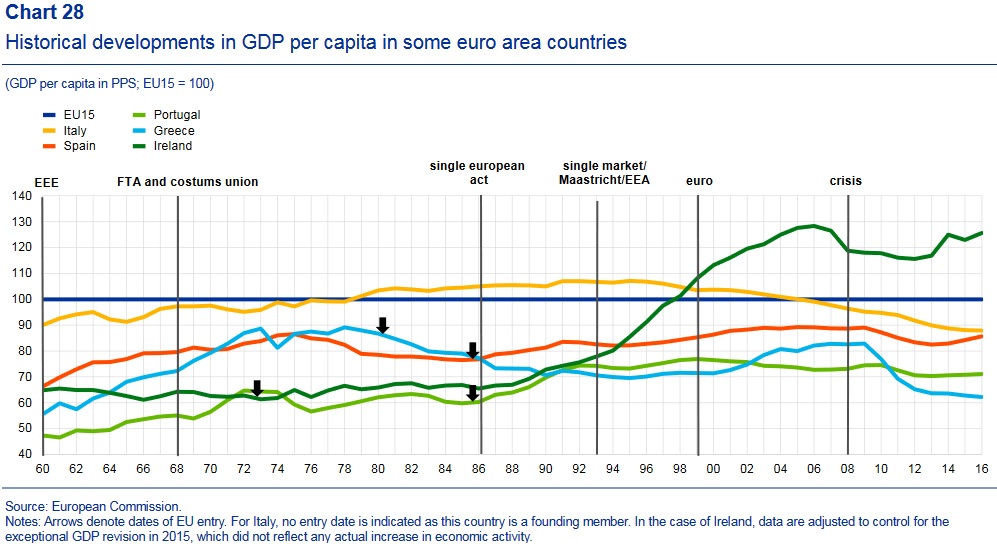Earlier this month, as part of my ongoing series about convergence and divergence, I wrote about why South Korea has grown so much faster than Brazil.
My main conclusion is that nations need decent policy to prosper, and Johan Norberg shares a similar perspective in this video.
Let’s see what academic researchers have to say about this topic.
In an article for the Journal of Economic Literature, Paul Johnson and Chris Papageorgiou have a somewhat pessimistic assessment about the outlook for lower-income countries.
In its simplest form, convergence suggests that poor countries have the propensity to grow faster than the rich, so to eventually catch up to them. …there is a broad consensus of no evidence supporting absolute convergence
in cross-country per capita incomes—that is poor countries do not seem to be unconditionally catching up to rich ones. …Our reading of the evidence…is that recent optimism in favor of rapid and sustainable convergence is unfounded. …with the exception of a few countries in Asia that exhibited transformational growth, most of the economic achievements in developing economies have been the result of removing inefficiencies, especially in governance and in political institutions. But as is now well known, these are merely one-off level effects.
Here’s a table from their study.
As you can see, high-income countries (HIC) generally grew faster last century, which is evidence for divergence.
But in the 2000s, there was better performance by middle-income countries (MIC) and low-income countries (LIC).
That seems to be evidence that the “Washington Consensus” for pro-market policies generated good results.
Indeed, maybe I’m just trying to be hopeful, but I like to think that the last several decades have provided a roadmap for convergence. Simply stated, nations have to shift toward capitalism.
For another point of view, Dev Patel, Justin Sandefur and Arvind Subramanian have a somewhat upbeat article published by the Center for Global Development.
…the basic facts about economic growth around the world turned completely upside down a quarter century ago—and the literature doesn’t seem to have noticed. …While unconditional convergence was singularly absent in the past,
there has been unconditional convergence, beginning (weakly) around 1990 and emphatically for the last two decades. …Looking at the 43 countries the World Bank classified as “low income” in 1990, 65 percent have grown faster than the high-income average since 1990. The same is true for 82 percent of the 62 middle-income countries circa 1990. …It’s not “just” China and India, home to a third of the world’s population on their own: developing countries on average are outpacing the developed world.
Here’s a pair of graphs from the article. On the left, we see nations of all income levels grew at roughly the same rate between 1960 and today.
But if we look on the right at the data from 2000 until the present, low-income and middle-income countries are enjoying faster growth.
That article, however, doesn’t include much discussion of why there’s been some convergence.
So let’s cite one more study.
In a report for the European Central Bank, Juan Luis Diaz del Hoyo, Ettore Dorrucci, Frigyes Ferdinand Heinz, and Sona Muzikarova look for lessons from European Union nations.
…sound policymaking plays a key role in the attainment of real convergence, primarily via adequate measures and reforms at national level. …for a given euro area Member State to achieve economic convergence it needs to improve its institutional quality, i.e. that of those institutions
and governance standards that facilitate growth… some euro area countries have not met expectations in terms of delivery of sustainable convergence… in the period 1999-2016 income convergence towards the EU average occurred and was significant in some of the late euro adopters (the Baltics and Slovakia), but not in the south of Europe. …Several low-income euro area members have, in fact, only just maintained (Slovenia and Spain) or even increased (Greece, Cyprus and Portugal) their income gaps in respect of the EU average.
Let’s close with two charts from the ECB study.
First, look at this chart tracking the relative performances of Italy, Spain, Portugal, Greece, and Ireland compared to the average of Western European nations.
What stands out is that Ireland went from being a relatively poor nation to a relatively rich nation.
Needless to say, I would argue that Ireland’s dramatic improvement is closely correlated with a shift toward free markets that began in the 1980s.
Indeed, Ireland currently has the 10th-highest level of economic freedom for all countries.
Next, here’s a chart reviewing how various European nations have performed since 1999.
Ireland grew the fastest, given where it started. But notice how Slovakia and the Baltic nations also have been star performers.
So the nations that have adopted free-market reforms have grown faster than one might expect based on convergence theory.
And you won’t be surprised to see that the nations that have lagged – Greece and Italy – are infamous for statist policies and an unwillingness to reform.
The bottom line – assuming you want to improve the lives of people in poor nation – is that the world needs more capitalism and less government.



